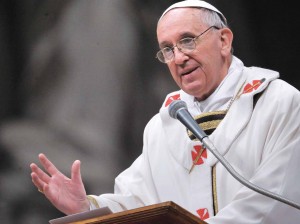Front Row With Francis: On Scandal
 Key to seeing the Holy Father’s message this week is reading again the opening passage of Matthew 18, read in St. Peter’s Square before the general audience.
Key to seeing the Holy Father’s message this week is reading again the opening passage of Matthew 18, read in St. Peter’s Square before the general audience.
Distracted by the question of “greatness before God,” the apostles ask Jesus who would be the greatest. Jesus answers the question in a kind of rebuke, saying that only those who become like little children will even enter the Kingdom of Heaven. Jesus goes on to condemn those who would lead his children into scandal, and then that they should love the little ones so earnestly that they would leave the ninety-nine sheep to find the hundredth.
In this context, the Holy Father’s commentary becomes clearer. Children and their love are favorite topics of his pontificate. Though he focuses on biological children of parents he eventually extends this to the spiritual children of Mother Church and her priests, so keep this in mind as we explore this Wednesday message.
Love carries with it, Francis said, an implicit promise to life for the child. We promise from the moment they are “concieved in thought” that life is worth living, that there will be a future, and further that we want to give our them, our children, that future, even before we know them.
Just as God is faithful in his love and in his promises, so should we be faithful in our promises to our children. Even when they cry, and even when they make a mess, and even when we are tired and don’t want to be faithful, we must remain faithful.
Yet we are often faithless, and Mother Church can be this way as well — remember that Francis begins this audience asking for forgiveness for any scandal the Church has recently caused.
Continued faithfulness is the confirmation of the promise, and children, vulnerable in the hands of their parents, expect confirmation. We are vulnerable in the hands of our parents and in the hands of God and in the hands of Mother Church, and in this same way we see the total dependence of our children in our arms.
In the same way that we are wounded when a promise is betrayed — in the same way we are wounded when a priest chides us cruelly, when a bishop takes more after Arius than Athanasius — a child is wounded when a parent does not follow through. We are, literally, scandalized. We are led by their bad example into sin, whether the sin of despair, or apostasy, or a sin by example.
Woe to our bishops who lead us astray, and woe to those parents who scandalize their children and lead them into sin. They abandon themselves into our hands, and yet we betray that trust.
Taking that to heart, consider that parents and pastors alike betray that trust, and this often takes the form of pretending to be the world to our children. Instead of pointing their natural love and trust of God to God, we pervert them and point them to ourselves even if we don’t mean to do so.
A phrase he uses deserves a closer look than it would otherwise merit. “No sooner a child is able to feel that he is loved for himself, he also feels there is a God who loves children.” A child must not be loved as an accessory, as if two-and-a-half children, at least one male and at least one female, would so perfectly complement our lives on our own terms.
To add a gloss on this comment, how presumptious is this attitude which insists that children must come when convenient, and how perfect a correction against that attitude is the Church’s teaching that every act of sex must be open to life. Human love cannot make demands beyond its authority, and just so human love must not insist on absolute timing and perfection by human standards, as if by some pelagian impulse we can control our own fate.
Just as children are a gift and in the image of God, just so are our children a gift and should not be manhandled into an image of ourselves. We try to be more real than God so that all of the love of the child ends in us and not God, and this is one of the most fundamental betrayals of trust a parent — or a pastor — can inflict on a child.
As parents, we must not lead by a cult of personality. Instead, we must let the love of God and the light of God shine through us to our children. In this way we are loving them, we are giving the real us to them, not some lie about ourselves we tell ourselves.
We cannot do so perfectly in this life, so it is fitting that Pope Francis concludes by invoking St. Joseph, receiver and protector of Mary and Jesus. St. Joseph was a promise-keeper, Francis said. Let him be an encouragement to all parents who suffer in the taint of sin, which is all parents this side of the Mother of God.
St. Joseph is the only member of the Holy Family who has sinned, and yet he is a saint and an especially holy saint. Imagine whether St. Joseph felt inadequate next to his foster child who was God and his betrothed who was perfect without sin. Yet St. Joseph is still “Saint” Joseph.
God in his love desires perfection but God in his mercy does not expect it. Let us be vulnerable in the hands of God, trusting in his promises, so that our children may do the same to us.

